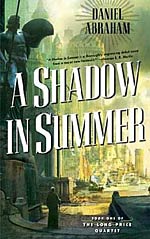
![]() Tantara
Tantara
1/14/2012
![]()
I must admit I expected to find this story tedious, as I often do multi-volume fantasy epics. But I was very pleasantly surprised. Daniel Abraham's world-building is top-tier, and his characters are complex and realistic. There are no moral absolutes here, thankfully...I've always despised broad strokes of black and white laid out to clue the reader in to "good" and "evil." (This is one of my biggest pet peeves with fantasy literature in general.) The reader is just as likely to feel genuine empathy for a "villain" in this story as to become disgusted by a beloved "hero", and for me this keeps the story believable.
The magic in A Shadow in Summer, such as it is, is unusual and language-based. (Thought-based, will-based, or imagination-based might be better ways to describe it. The wielders, rather than being called wizards, sorcerors, or witches, etc., are called poets, and it is an apt term.) There's no flash-bang tide-turning effects here, no battle magic, no incantations or hand-waving. The magic of the Andat is long-term, subtle, insidious, dangerous to the wielder, and vital to the prosperity of the people. It is also ethically questionable in the extreme, as it involves enslaving a being to one's will...or rather creating a being of one's will and then enslaving that part of oneself. It's complicated and darkly beautiful.
The people's language (of communication, not of magic) is both subtle and complex, full of ritualized gesture and nuanced body language. The characters - young men, old men, young women, old women, laborers, thugs, scholars, merchants, kings, demigods - were varied and colorful, and I enjoyed getting to know even those I did not actually like. The city of Saraykeht fairly breathed, steeped in the sensuality of food and scent and sound, as well as alive with the hum of local industry. I found there was just enough detail to make me believe and drift into imagination, but not so much as to see me skimming past descriptive passages or becoming bored.
The plot was well-paced and twisty, with some surprises I genuinely did not see coming. I love when an author actually puts one past me, as I am as jaded a reader as you will be likely to encounter. Ethical dilemmas, intrigue, tension, realistic and unsappy love, grinding guilt, wrenching sadness, betrayal, tenderness, lies, respect... Abraham writes all these well and affectingly and stays largely free of cliché in the process.
Even though this is the first of a 4-part series, the author wraps up the story neatly by the end of this first installment, so it works nicely as a stand-alone work. I have stated many times that I am not really a series reader, and that statement still holds, but I am already missing the vaguely Asian-meets-Arabesque atmosphere of the cities of the Khaiem, with something of the feeling of melancholy that permeates the story itself. I will most likely be drawn to read the second entry in the Long Price Quartet soon.
http://www.sfsolitaire.blogspot.com/